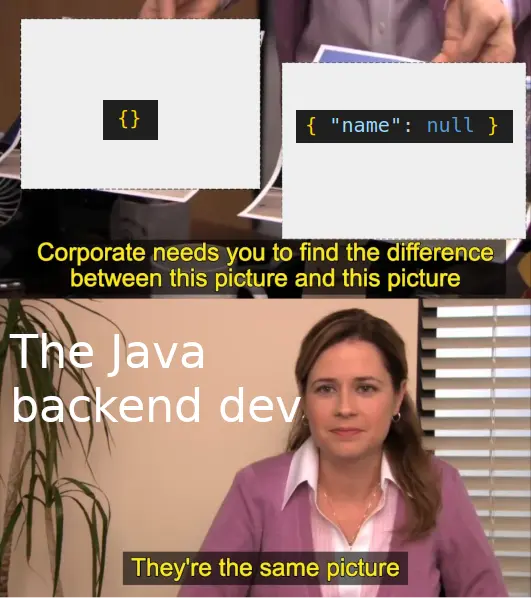this post was submitted on 30 Jun 2024
284 points (94.9% liked)
Programmer Humor
22451 readers
1709 users here now
Welcome to Programmer Humor!
This is a place where you can post jokes, memes, humor, etc. related to programming!
For sharing awful code theres also Programming Horror.
Rules
- Keep content in english
- No advertisements
- Posts must be related to programming or programmer topics
founded 2 years ago
MODERATORS
you are viewing a single comment's thread
view the rest of the comments
view the rest of the comments

Again, did you actually read the comments?
Is SQL an API contract using JSON? I hardly think so.
Java does not distinguish between null and non-existence within an API contract. Neither does Python. JS is the weird one here for having two different identifiers.
Why are you so hellbent on proving something universal that doesn't apply for the case specified above? Seriously, you're the "well, ackshually" meme in person. You are unable or unwilling to distinguish between abstract and concrete. And that makes you pretty bad engineers.
If your SQL model has nulls, and you don't have some clear way to conserve them throughout the data chain, including to the json schema in your API contract, you have a bug. That way to preserve them doesn't have to be keeping nulls distinct from missing values in the json schema, but it's certainly the most straightforward way.
The world has more than three languages, and the way Java and Python do things is not universally correct. I'm not up to date on either of them, but I'm also guessing that they both have multiple libraries for (de) serialization and for API contract validation, so I am not really convinced your claims are universal even within those languages.
I am not the other person you were talking to, I've only made one comment on this, so not really "hellbent", friend.
Yes, I am pretty sure I read the comments, although you're making me wonder if I'm missing one. What specific comment, what "case specified above" are you referring to? As far as I can see, you are the one trying to say that if a distinction between null and a non-existent attribute is not specified, it should universally be assumed to be meaningless and fine to drop null values. I don't see any context that changes that. If you can point it out, specifically, I'll be glad to reassess.